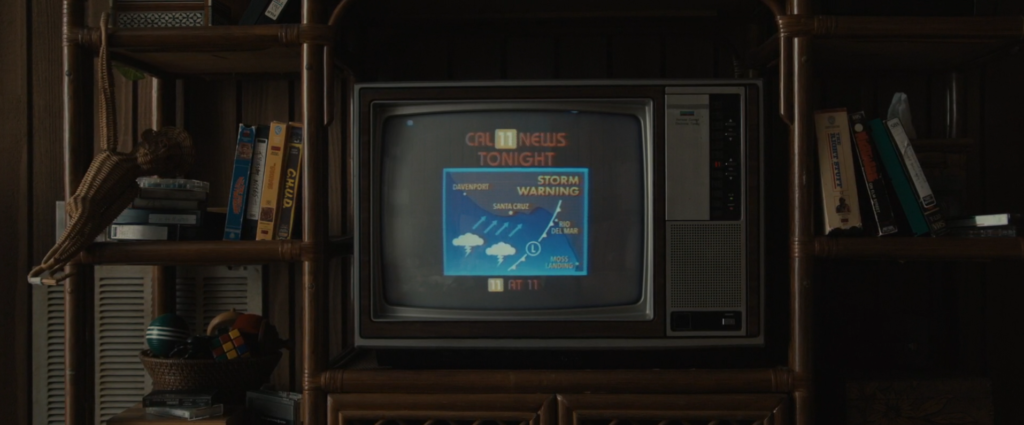
Oscar Goff is the film section editor and senior film critic for Boston Hassle, and he is very tired.
As regular Hassle readers may have gleaned, 2019 was quite a year for the film section. Not only did we expand our ranks, land some amazing interviews, and achieve our most successful year of festival coverage ever, but we also finally gained access to advance press screenings, bringing the Film Flam team to the front lines of new release reviews. Thanks to these newfound press credentials, I was able to personally see more new movies than ever before. At last, I thought, I’d be able to stride into my year-end list with confidence, knowing that I’d seen everything I’d meant to with only a handful of oversights. This year’s list would be a piece of cake!
Ha.
As it turns out, having a deeper bench of films seen makes narrowing them down to a tight, ranked ten way the fuck harder. Adding to the conundrum is that 2019 was a damn fine year for movies (continuing the tradition of closing out decades on a high note). This year I could easily build entirely solid top-ten lists entirely out of those that didn’t make the cut. How do I winnow so many worthy films into something resembling a list?
By cheating, obviously. This year, rather than pull together a conventional top ten list, I’ve paired my favorite films of the year into a series of ten “ties.” Each pairing is thematically linked– some admittedly more tangentially than others, though I contend that each of these would at the very least make a satisfying double feature– and then ranked them by weighted average of the two films together. Unprofessional? Maybe. Unscientific? Absolutely. But it’s my list, and I’m my own editor, so you’re just going to have to live with it.
ANYWAY. Enough of my handwringing. Let’s get to the list!
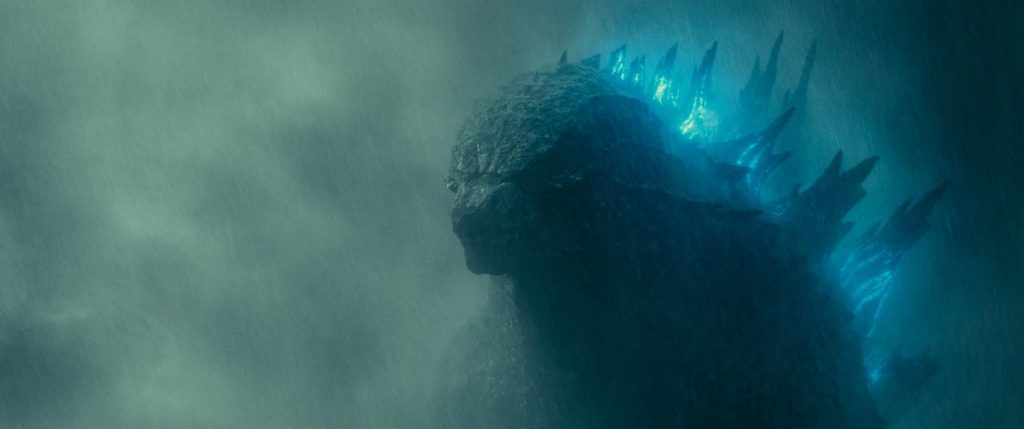
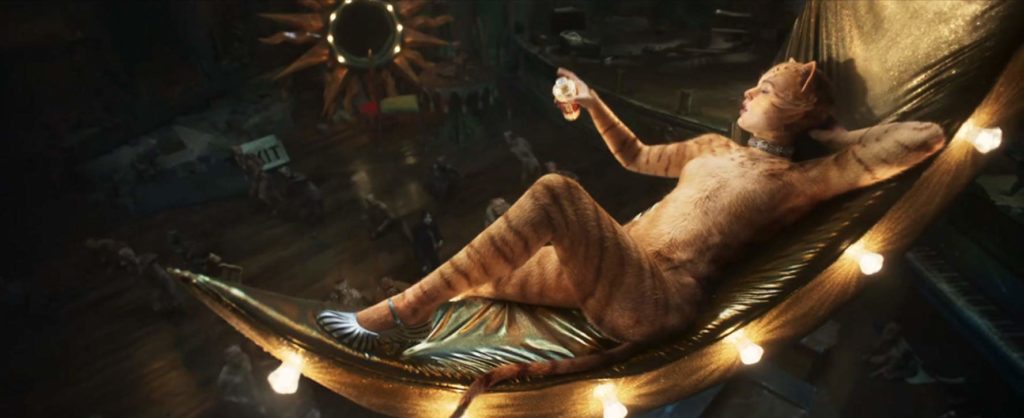
“HONORABLE” MENTION (tie): GODZILLA: KING OF THE MONSTERS (dir. Michael Dougherty) / CATS (dir. Tom Hooper)
Actually, before we get into the list proper, I want to acknowledge two movies which are in no conventional sense “good,” but which in a very real way are integral to my 2019 in movies. As our own Kyle Brunet noted, Michael Dougherty’s sequel to 2014’s American Godzilla is kind of a mess: its dialog is clunky, its politics are confused, and its overqualified cast never quite knows what to do with it (top honors go to Bradley Whitford, who visibly gives less of a shit as the movie continues, and Sally Hawkins, who sticks around just long enough to fulfill her contractual obligation from the original). But here’s the thing you need to know: they blow up Boston! Godzilla and King Ghidorah face off at Fenway Park! Mothra shoots her webbing onto the John Hancock building! The Paul Revere statue stands out from the wreckage! It may be dumb, but I had a big dumb smile on my face both times I paid to see it.
And then there’s Cats. I went into Cats with pretty measured expectations, and it delivered. But, funny thing: it stuck with me. When I went home for the holidays and relatives asked me how the site was going, I almost always wound up breathlessly describing this monster of a film. Friends started telling me that they decided to see it on the strength of my review, and then brought their friends to see it. I began to suspect that, if I were to drop dead, my tombstone would read “He saw Cats.” And it’s not just me: in less than a month, it’s gone from a catastrophic theatrical run to sold-out audience participation screenings at the Somerville and the Coolidge. Simply put, Cats is the damnedest thing, and, for better or for worse, we’re probably going to be talking about it long after some of this year’s Oscar contenders have faded from memory.


10 (tie). THE BEACH BUM (dir. Harmony Korine) / UNDER THE SILVER LAKE (dir. David Robert Mitchell)
In all honesty, I’m not actually sure these two are “good” movies either, but both are so singularly weird and idiosyncratic that I couldn’t leave them off. For much of its first act, The Beach Bum feels like one-time enfant terrible Harmony Korine reckoning with his own mortality and continued relevance: as burnout Florida-man poet laureate Moondog, Matthew McConaughey seems to be playing a singularly noxious critique of the director’s art-sleaze persona. But then, about halfway through, the film unexpectedly softens into the silliest, most likably immature feature of Korine’s career. It’s weirdly charming, and left me beaming. Similarly, Under the Silver Lake is in many ways a maddening, enervating experience starring possibly the year’s most (intentionally) uninspiring protagonist, but it’s so densely packed with ideas, references, sketches, and secret codes that I could hardly wait to watch it again. Far from everything works, but like its hero, its focus flits so quickly that it’s never long before it moves onto something that does. It’s got a killer soundtrack and at least one of my absolute favorite scenes of the year, and made me want to dig out my old back issues of Nintendo Power.
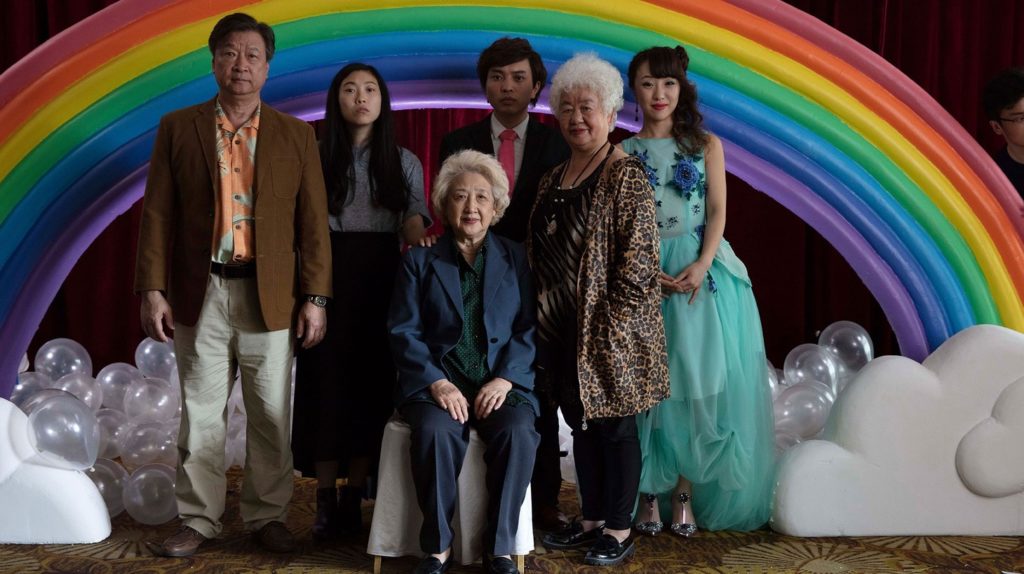
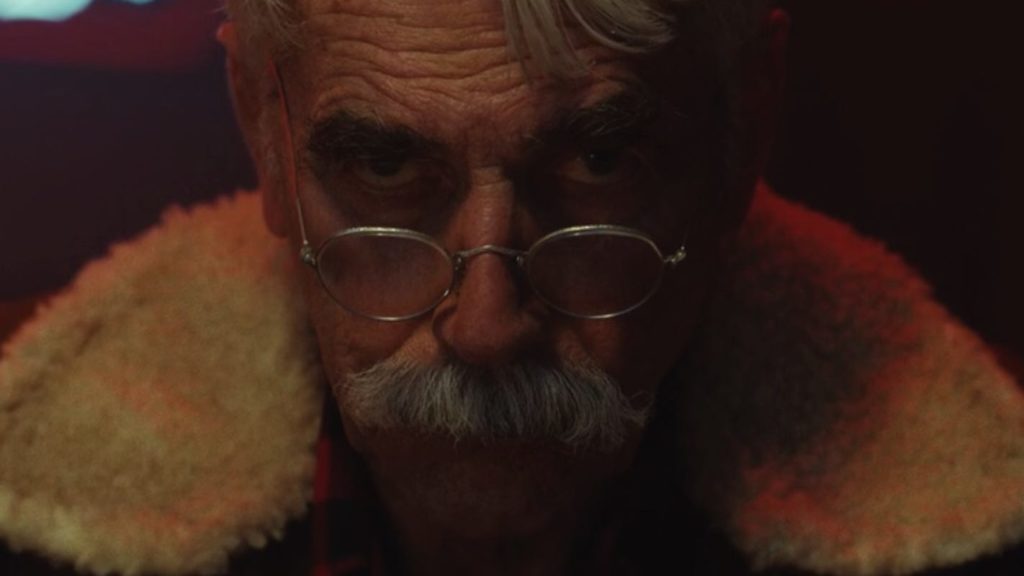
9 (tie). THE FAREWELL (dir. Lulu Wang) / THE MAN WHO KILLED HITLER AND THEN THE BIGFOOT (dir. Robert D. Krzykowski)
Okay, okay, okay, but hear me out: these are two of the most empathetic films about aging in recent memory. Both Zhao Shuzhen’s Nai Nai and Sam Elliott’s Calvin Barr are remarkable people in the twilight of their lives, and both are in danger of being forgotten. In Nai Nai’s case, it’s the family who refuses to let her know about her terminal cancer diagnosis to let her pass quietly; for Barr, it’s the absence of family, and thus no one to know about his truly astounding exploits. In The Farewell, we see the Nai Nai through the eyes of Billi, Awkwafina’s brilliantly relatable thirtysomething protagonist, as a treasure in danger of disappearing just as suddenly as the China of her youth. In Hitler/Bigfoot, we retrace Barr’s life through his own eyes, squaring up his triumphs and regrets with equal bittersweetness. Both are funny, lovely movies that just might make you cry in spite of yourself.
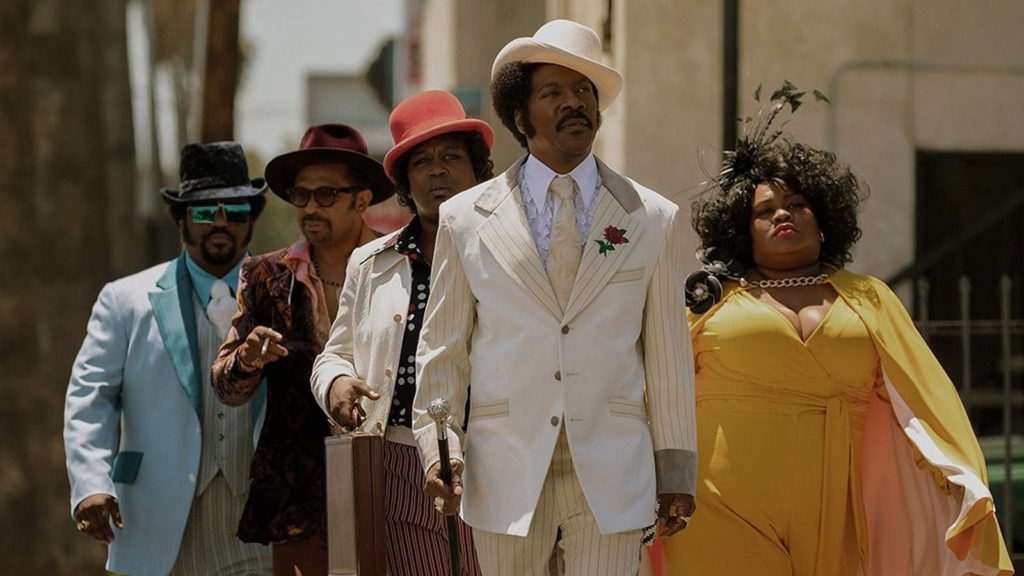
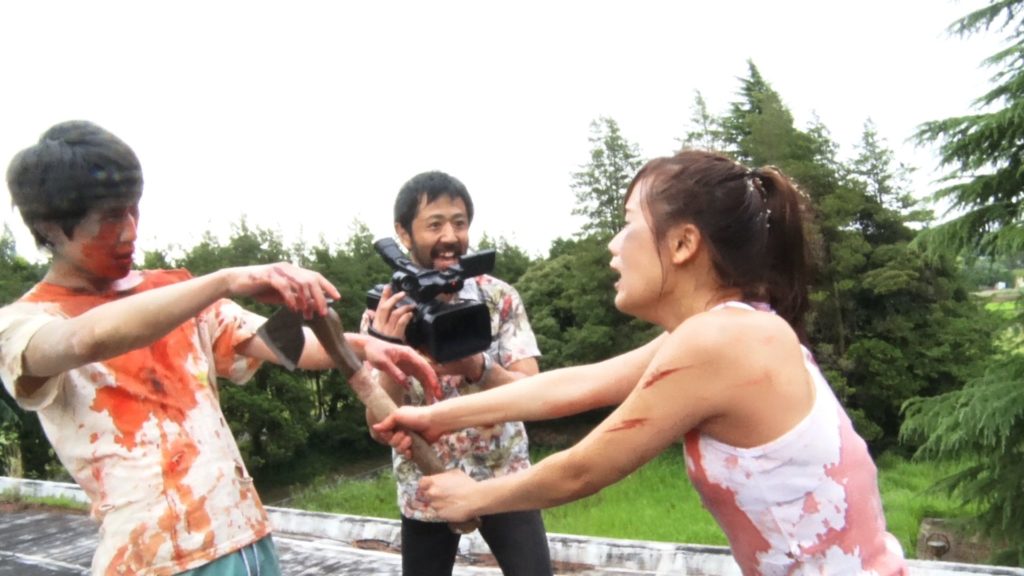
8 (tie). DOLEMITE IS MY NAME (dir. Craig Brewer) / ONE CUT OF THE DEAD (dir. Shinichirou Ueda)
Anyone who’s ever tried to make a film on little to no budget will tell you: it is a bitch. Equipment is expensive, directing your friends is like herding cats, and god help you when you get to the editing room and realize none of your shots match. At the same time, however, little can compare to the thrill when you get to the end and realize that, holy shit, you made this. Netflix’s Rudy Ray Moore biopic Dolemite Is My Name captures this sense perfectly. Moore is, in many ways, a truly ridiculous person, and his film, the blaxploitation cult classic Dolemite, is deeply silly and amateurish. Yet, against all odds, he and his band of friends and industry fringe characters managed to not only create something, but something both widely beloved and phenomenally successful. I won’t say too much about Shinichirou Ueda’s global sleeper hit zom-com One Cut of the Dead, as I still don’t want to spoil the big twist (it’s currently streaming on Shudder, which you really ought to be subscribing to anyway), but suffice to say that it’s just as joyous a celebration of the trials and triumphs of beating the odds and making a damn movie. Both films made me want to bang out a script, call up my buddies, and dust off my old clapboard.
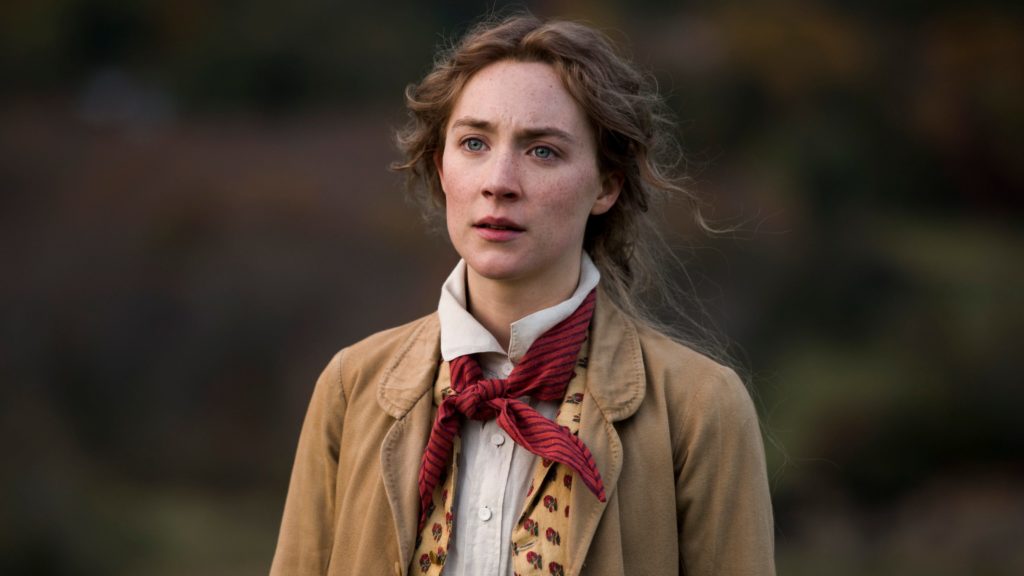

7 (tie). LITTLE WOMEN (dir. Greta Gerwig) / PAIN AND GLORY (dir. Pedro Almodóvar)
Greta Gerwig’s Little Women and Pedro Almodóvar’s Pain and Glory present far more sober reflections on the creative life, from directors at opposite points in their careers. In Pain and Glory, Antonio Banderas (never better) plays a stand-in for longtime collaborator Almódovar as Salvador Mallo, an aging arthouse filmmaker struggling to regain the motivation to work in the face of a litany of chronic ailments, as well as depression, casual drug addiction, and aging in general. While Almódovar knows better than to suggest there’s an easy fix for any of this, the film’s final reveal that inspiration hasn’t left Mallo after all will make you stand up and cheer. In contrast to this end-of-career elegy, Little Women is a thinly disguised report from the frontlines by a director near the beginning of hers. Coming off her explosive debut Lady Bird, Gerwig makes the audacious choice of casting the novel’s iconic heroine Jo March (and implicitly, by extension, Louisa May Alcott) as an avatar for her own struggles to assert herself as a young, female creative in an industry dominated by old men. As in Pain and Glory, the ending of Little Women plays a dazzling trick of blurring narrative, as March (slash-Alcott-slash-Gerwig) wrests control of her own career. The message in both is the same: the creative life is a tough row to hoe, but damned if it isn’t worth it.

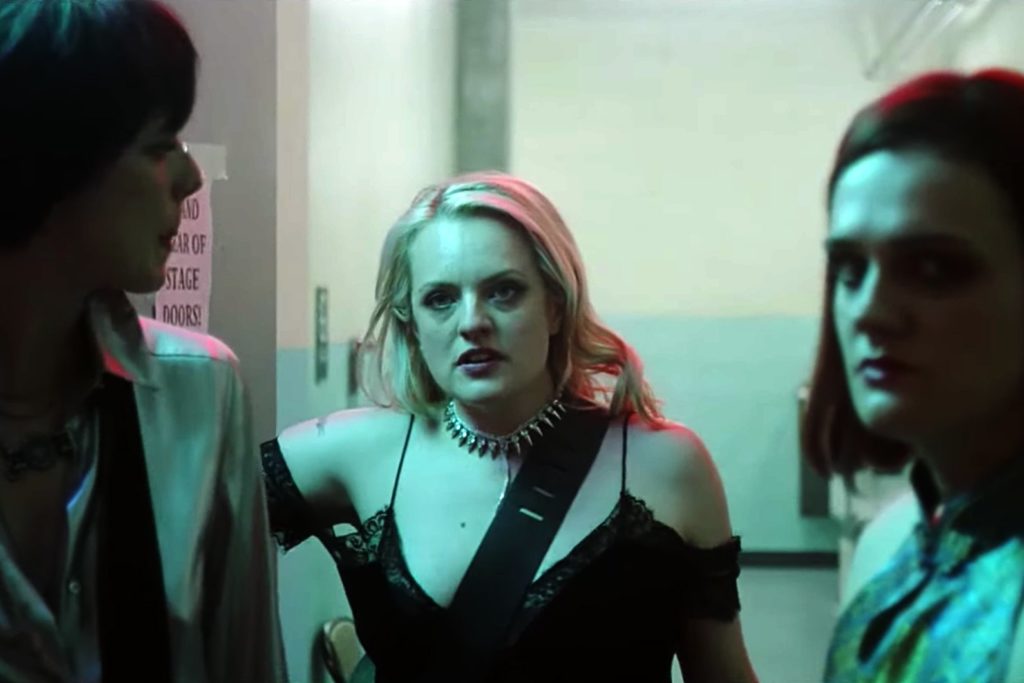
6 (tie). UNCUT GEMS (dir. Josh & Benny Safdie) / HER SMELL (dir. Alex Ross Perry)
Neither Uncut Gems nor Her Smell is a horror movie in any sense of the word, but both create a sense of suffocating, disorienting dread on par with anything by Tobe Hooper or John Carpenter. Both Adam Sandler’s pathological jeweler Howard Ratner and Elizabeth Moss’ narcissistic riot grrl Becky Something are veritable maelstroms of human beings, sucking all those around them– and the audience– into their own swirling personal vortexes of toxic chaos. Both films are so fully enveloping– not only in their performances, but also in cinematography, editing, and especially sound design– that one might find themselves forgetting to breathe. And while the two films leave their characters in very different places, one thing is for sure: you will never forget either of them.
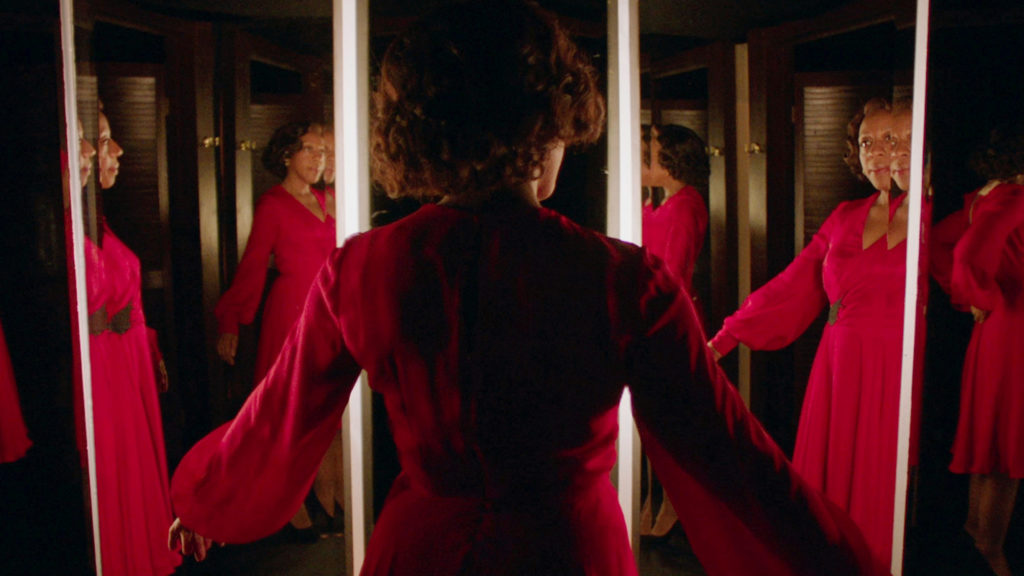
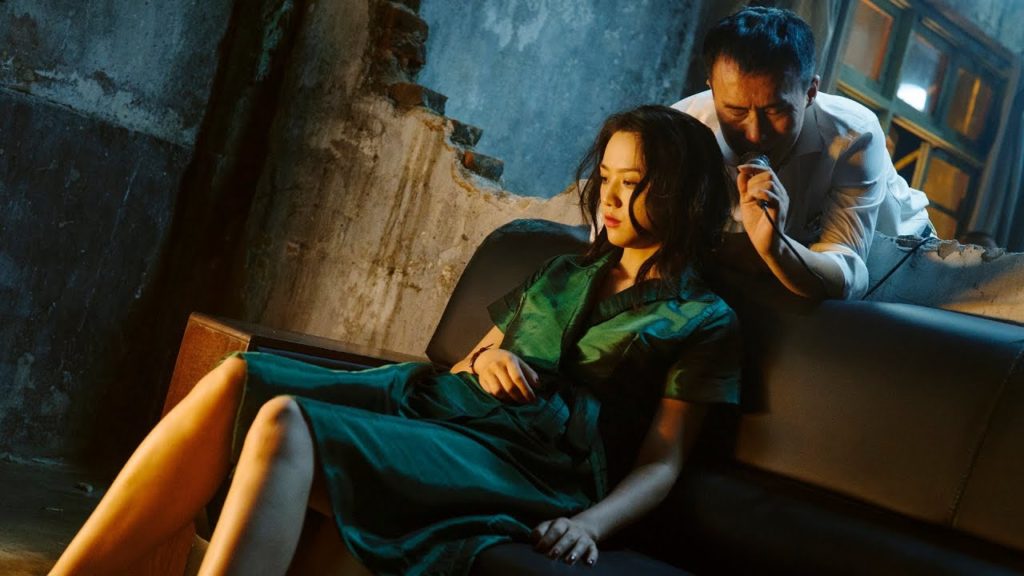
5 (tie). IN FABRIC (dir. Peter Strickland) / LONG DAY’S JOURNEY INTO NIGHT (dir. Bi Gan)
Two films which take the aesthetics of exploitation cinema and weave them into something weird, wonderful, and phantasmagoric. For its first hour, Bi Gan’s international smash Long Day’s Journey into Night plays something like a standard issue post-Tarantino neo-noir, all candy-colored visuals and tricky non-linear time jumps… up until the protagonist ducks into a movie theater and watches himself on screen, when the film suddenly dives headlong into a dazzling hour-long 3-D tracking shot. Peter Strickland’s psychedelic horror comedy In Fabric, meanwhile, drops the viewer into terra incognita right off the bat, twisting the trappings of Italian giallo films and ‘70s BBC advertising into something gloriously off-kilter and deliriously funny (it also includes easily my favorite character of the year in Fatma Mohammed’s Miss Luckmoore). Both will leave you in something of a daze as you stumble back into the real world– if you can be sure there is such a thing.
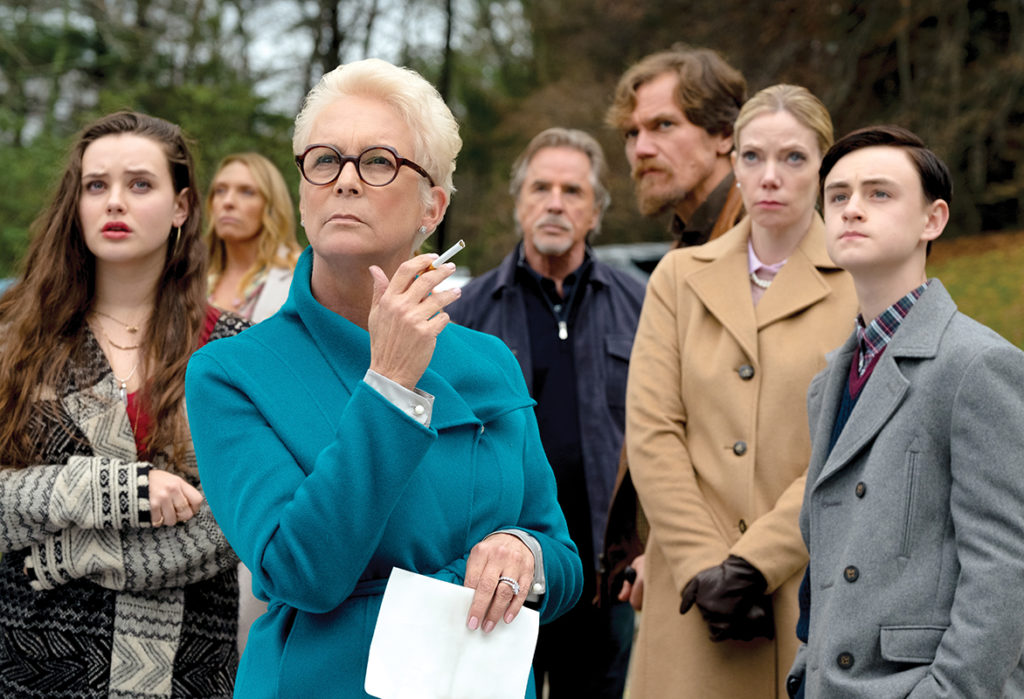
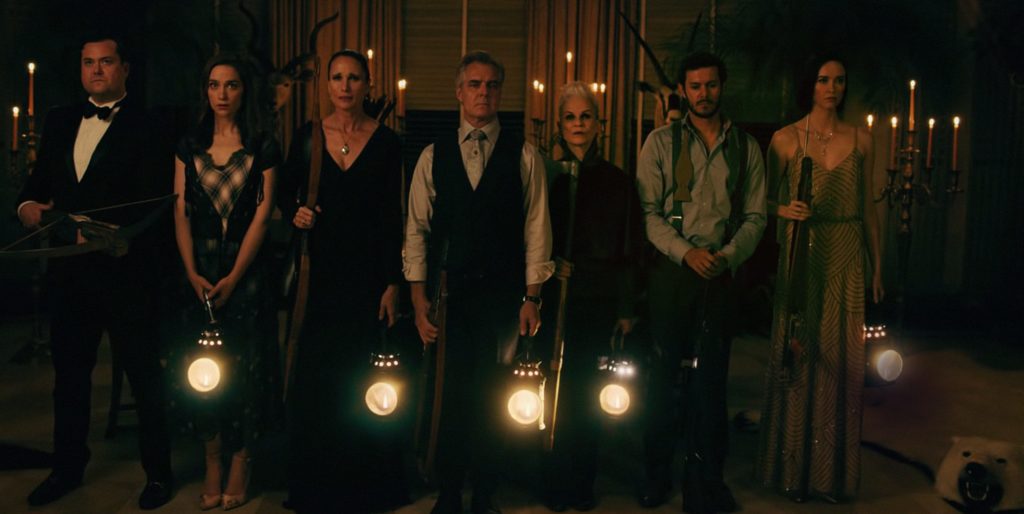
4 (tie). KNIVES OUT (dir. Rian Johnson) / READY OR NOT (dir. Matt Bettinelli-Olpin & Tyler Gillett)
Hey, here’s a novel viewpoint: rich people fucking suck. In the age of Trump and me-first boomer entitlement, it should come as no surprise that 2019 gave us two all-timers in the fertile rich-assholes-in-a-mansion-get-theirs black comedy genre (see also: Clue, You’re Next). In Ready or Not, these themes manifest as a horror movie, taking the venerable Most Dangerous Game template and applying it to the incompetent, insulated one-percenters of today (one would-be hunter steals away to the bathroom to watch crossbow tutorials on YouTube). Knives Out, meanwhile, bends the Agatha Christie whodunnit to incorporate ripped-from-the-headlines themes of immigration, racial and class inequality, and general lily-white entitlement. You may not be able to literally eat the rich, but these movies amount to a pair of wickedly funny cooking shows.
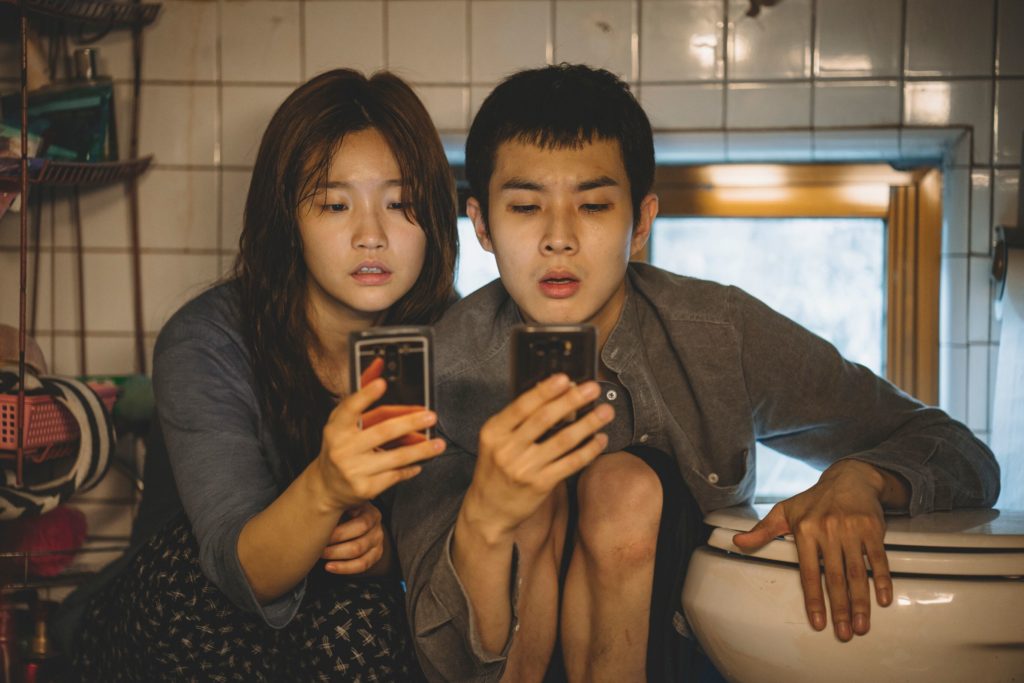
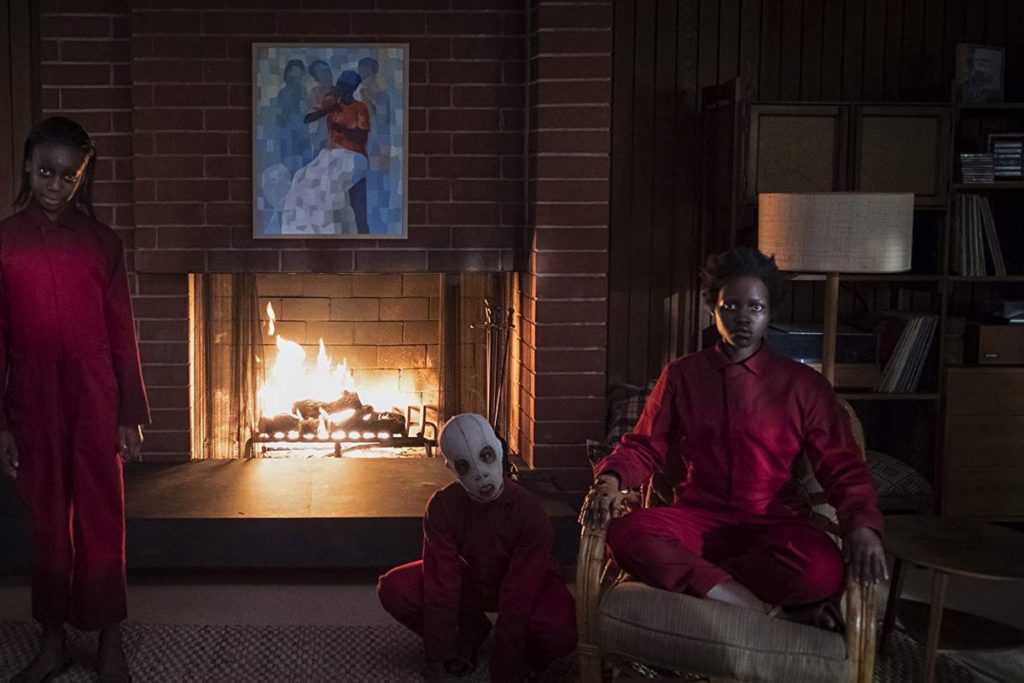
3 (tie). PARASITE (dir. Bong Joon-ho) / US (dir. Jordan Peele)
If Ready or Not and Knives Out represent a pie in the face to the establishment, Parasite and Us amount to a pair of molotov cocktails. When I first watched Us I found it ambitious to a fault, but a rewatch revealed it to be a much more rewarding beast; if it lacks the laser focus of Get Out, it more than makes up for it with its complex, acridly satirical take on class struggle. In its central conceit– a hidden underclass rising up to usurp their oblivious oppressors– it shares more than a little DNA with Bong Joon-ho’s Parasite. There’s not much I can say about Parasite that hasn’t been said elsewhere at this point (read our own Anna Hoang’s review here), other than that its success is probably the most purely good thing to happen to us in 2019, and I hope Bong tears the Academy a new asshole.
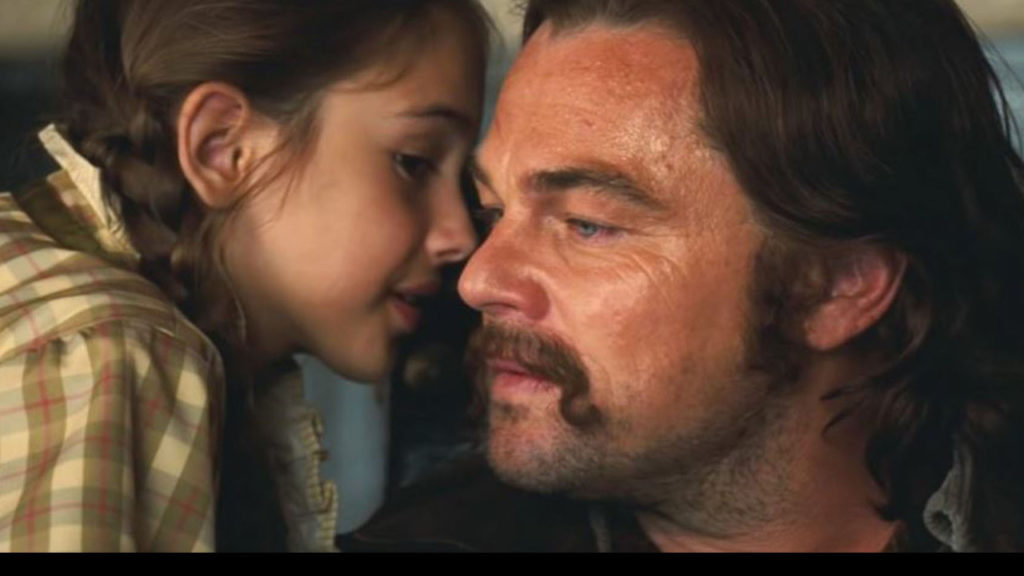
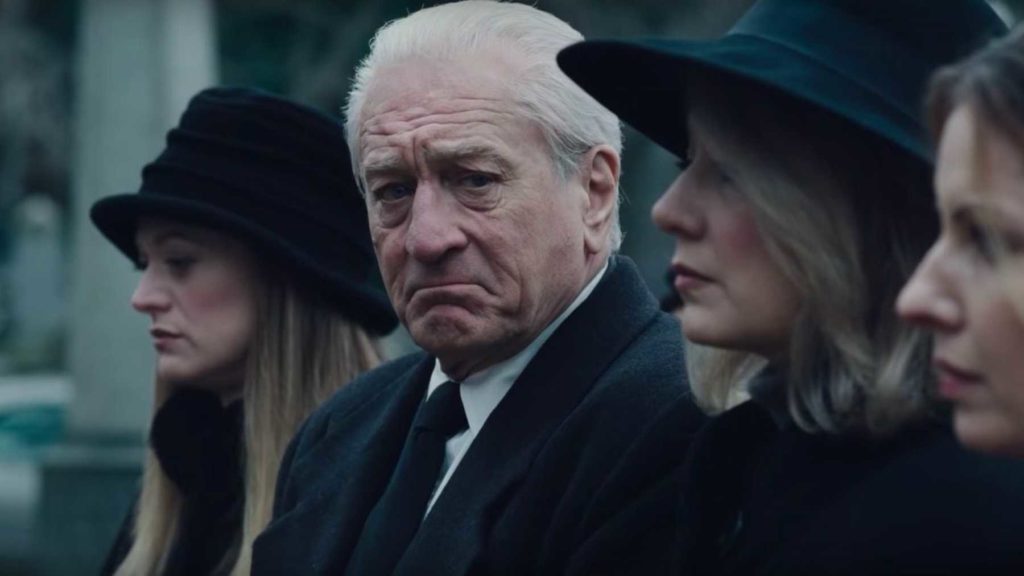
2 (tie). ONCE UPON A TIME IN HOLLYWOOD (dir. Quentin Tarantino) / THE IRISHMAN (dir. Martin Scorsese)
Both Martin Scorsese and Quentin Tarantino know they’re almost certainly near the end of their respective careers– the latter by choice, the former by inevitability– so it makes sense that they would take a minute (or 210) to take stock and reflect. Even so, it’s likely that many were unprepared for the vulnerability on display in the two maestros’ latest films. The Irishman takes the form of the mob epics Scorsese has returned to time and again over the past half-century, but in a distinctly minor key; this time, he closes not on a punk rock anthem about doing it his way, but rather a quiet, plaintive request to leave the door open. Hollywood, meanwhile, takes everything you expect in a Tarantino film– the movie references, the bursts of extreme violence, the feet– but uses them to tell a story about people who love their lives and care about each others’ feelings, which I’m fairly certain is a first. Both are rich texts for auteurists and fascinating in their recreations of the past– or to just hang out with some masterfully played characters for a few hours.

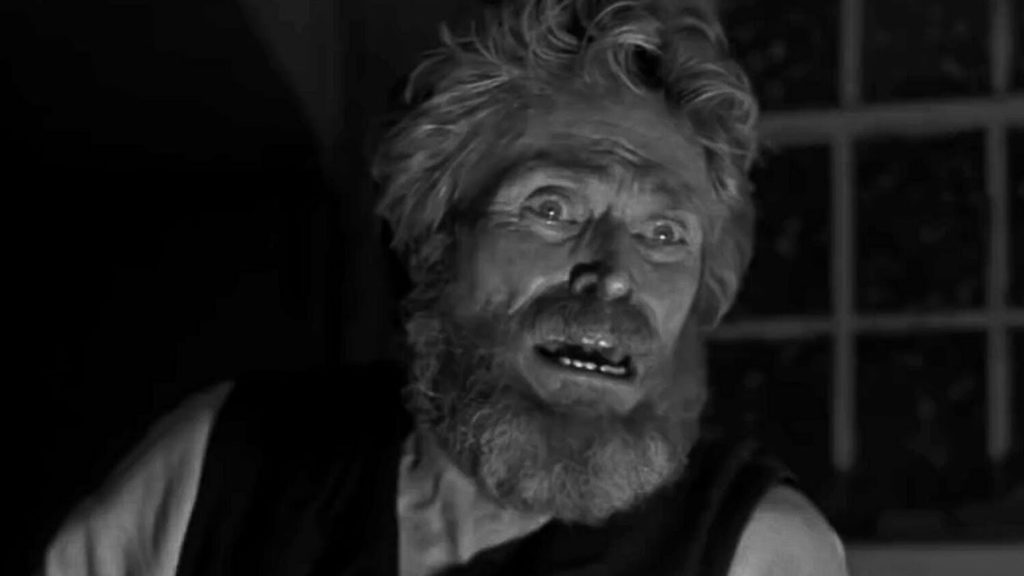
1 (tie). MIDSOMMAR (dir. Ari Aster) / THE LIGHTHOUSE (dir. Robert Eggers)
At long last, we come to two films that honestly don’t have much in common at all, beyond being darkly comic, visually avant-garde horror stories which somehow got smuggled into multiplexes by A24– and being my hands-down two favorite films of the year. Midsommar begins in a place of the shatteringly mundane horror that characterized the most shocking moments of Ari Aster’s debut, Hereditary, but soon strays into psychedelic folk horror worthy of Nicolas Roeg or Ken Russell, all in service of a surprisingly empowering message of ridding oneself of toxicity (Hereditary took me six months to work up to seeing again; including the director’s cut, I saw Midsommar four times in its initial theatrical run, which I’m fairly certain is a personal record). The Lighthouse, on the other hand, is a film so hysterically, defiantly weird that I still have trouble believing that it actually exists. That this creepy, flatulent nightmare comedy shot in (Oscar-nominated!) grainy black and white featuring Willem Dafoe and Robert Pattinson doing their best Blackbeard voices made it into major theaters and can currently be purchased at the checkout line at Target does my heart good– and reminds me why I put my through this year-end agony every year.
OH FUCK ALSO: High Life, Jojo Rabbit, The Last Black Man in San Francisco, Hail Satan?, The Dead Don’t Die, Scary Stories to Tell in the Dark

